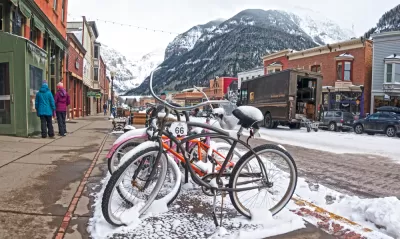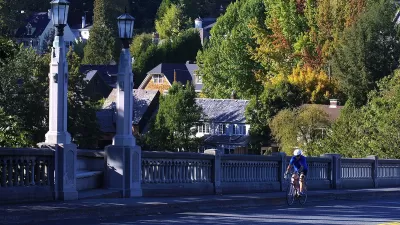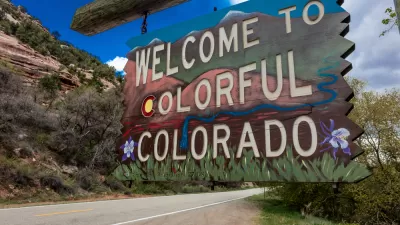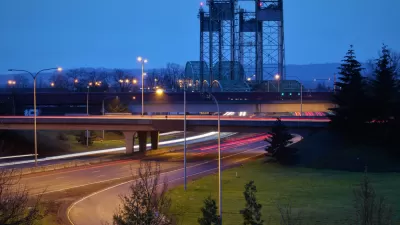The Colorado legislature has been unable to agree on a transportation funding package, but the recent bill passed by Oregon has prompted one influential Republican senator to suggest that the state tax bicycle sales.

After the death of a bill last April to allow a statewide vote on a sales tax increase for transportation projects, assistant Majority Leader Ray Scott, "an influential Republican from Grand Junction," has found one tax he can embrace: taxing bicycles, reports Joey Bunch of ColoradoPolitics.com for The Gazette.
Referencing the first-of-its kind bike tax passed by the Oregon legislature on July 6, Scott, posted on his Facebook page, "We will be proposing something similar. They use the roads also.”
"Every other vehicle has a tax or sticker, but bicycles, which are ubiquitous on Colorado roads, get a free pass, even though they often have dedicated lanes, law enforcement and other taxpayer-funded public services," adds Bunch.
Unfortunately, Bunch doesn't indicate that the bike tax, while unique in the nation, is the smallest component, revenue-wise, in the comprehensive tax-and-fee package included in HB 2017, which awaits the expected signature or Democratic Gov. Kate Brown. Along with passing a $15 tax applied to adult bikes costing over $200, there are four other taxes and fees that Scott would presumably forcefully oppose:
- 10-cents per gallon gas tax applied over a 7-year period. The state gas tax is currently 31.13 cents per gallon, last increased in 2011 by six cents per gallon. Colorado's gas tax is 22 cents per gallon, last raised in 1991.
- 0.5 percent sales tax on (motorized) vehicles.
- 0.1 percent payroll tax to fund public transit statewide.
- $13 increase in vehicle title and registration fees to be applied in 2018, 2020 and 2022. Depending on their fuel efficiency, additional fees of $18 to $33 would apply, with electric vehicles paying $110.
The bike tax is expected to raise $1.2 million per year, according to BikePortland, or 0.235 percent of the total HB 2017 revenues, estimated at "$3.8 billion over 7 years," according to The Register-Guard.
Unfortunately, the Democrats quoted in The Gazette scoff at Scott's suggestion. If the senator is serious about emulating the Beaver State legislation, bike tax revenue would be used to fund bike and pedestrian infrastructure, making it safer for Coloradans to bike and walk.
Perhaps legislators would see the benefits of cyclists paying user fees to improve bicycling infrastructure, and would opt to allow residents to vote to increase the gas tax, rather than the sales tax, to improve the roads that motorists, as well as cyclists, use.
As posted in May and March, Colorado is the only state to have enacted a TABOR, short for Taxpayer Bill of Rights, which requires legislation that raises taxes be subject to a statewide plebiscite. Polling showed that a sales tax fared better than a gas tax.
Hat tip to Annie Dawid.
FULL STORY: Grand Junction's Scott: Tax bicycles, they use the roads, too

Alabama: Trump Terminates Settlements for Black Communities Harmed By Raw Sewage
Trump deemed the landmark civil rights agreement “illegal DEI and environmental justice policy.”

Planetizen Federal Action Tracker
A weekly monitor of how Trump’s orders and actions are impacting planners and planning in America.

Why Should We Subsidize Public Transportation?
Many public transit agencies face financial stress due to rising costs, declining fare revenue, and declining subsidies. Transit advocates must provide a strong business case for increasing public transit funding.

Understanding Road Diets
An explainer from Momentum highlights the advantages of reducing vehicle lanes in favor of more bike, transit, and pedestrian infrastructure.

New California Law Regulates Warehouse Pollution
A new law tightens building and emissions regulations for large distribution warehouses to mitigate air pollution and traffic in surrounding communities.

Phoenix Announces Opening Date for Light Rail Extension
The South Central extension will connect South Phoenix to downtown and other major hubs starting on June 7.
Urban Design for Planners 1: Software Tools
This six-course series explores essential urban design concepts using open source software and equips planners with the tools they need to participate fully in the urban design process.
Planning for Universal Design
Learn the tools for implementing Universal Design in planning regulations.
Caltrans
Smith Gee Studio
Institute for Housing and Urban Development Studies (IHS)
City of Grandview
Harvard GSD Executive Education
Toledo-Lucas County Plan Commissions
Salt Lake City
NYU Wagner Graduate School of Public Service





























